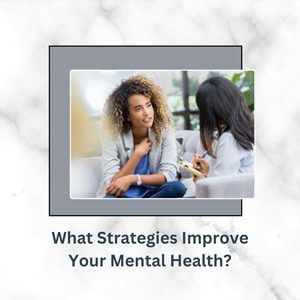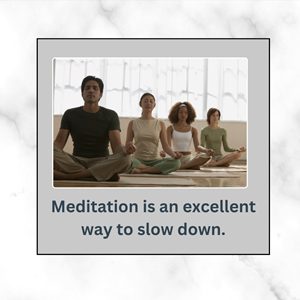 Just like physical health, you need to attend to your mental health, too.
Just like physical health, you need to attend to your mental health, too.
However when life gets busy or requires a lot from us, it is all too easy to ignore how you’re feeling and push aside your needs.
At best, this leads to burnout, which no one has time for.
At worst, it can result in disease, or loss of functioning due to anxiety and depression.
Your mental health is colossal in determining how you feel – the degree to which you enjoy your day-to-day experience – and as such, it should be a priority.
If you could use a little guidance, here are some strategies that may improve your mental health:
1. See a Therapist
Instead of saving the best, most powerful tip for last, we’re listing it first.
As mental health professionals, we witness the power of therapy first-hand. It’s one of the best ways to get people past what’s ailing or holding them back. It’s powerful: therapy brings clarity, helping people move forward in meaningful ways. Sessions include strategies and tools that make many aspects of life easier.
Time is precious, and therapy can save years of figuring life out the hard way by eliminating years of prolonged unnecessary suffering.
If you’re someone who loves a productivity hack, therapy is the best there is. It’s also the number one way to improve your mental health.
If you live in Northern California and are looking for a therapist near you, we offer counseling in Fair Oaks and Roseville – two convenient locations.
2. Uncover What You Need
Oftentimes, the feeling of overwhelm – a pressure in your chest or gnawing in your gut – is a good indicator something is wrong.
Yet the demands of life lead to many of us becoming unaccustomed to checking in with ourselves. This results in loss of ability to link an uncomfortable emotional state with the cause, or causes.
Journaling is a good way to uncover how you feel and provides powerful insight.
Getting it all on paper is helpful too, because it frees the worries from being jumbled together, trapped in the brain as repetitive thoughts.
3. Calm Your Sympathetic Nervous System
Meditation is an excellent way to slow down and calm the sympathetic nervous system.
 Think of it as a reboot.
Think of it as a reboot.
You can do it almost everywhere, even your desk at work. Take a few minutes to focus on your breath. If your mind wanders (which it will) just return to the breath. You don’t even need to close your eyes. Just unclench your jaw, relax your shoulders, and breathe.
When you’re at home, try a guided meditation. There are plenty of free guided meditations available on YouTube.
4. Schedule 10-Minute Check-Ins In Between Tasks
Many people compulsively reach for their phone during those in-between moments. You know, the one where you’re waiting for a meeting to start. Or you’re in line at the grocery store.
Instead of reaching for your phone which is another distraction that pulls you away from yourself, reach for yourself. How are you feeling?
If you’re exhausted or stressed, try to address it in a healthy way. Take walks. Get outside, breathe. Have a snack, drink water, take an art class. Make a point to try and go to bed earlier.
Those are much better coping strategies than compulsively scrolling or searching Amazon and purchasing a new pair of shoes.
The more attuned you are to how you feel, the less likely you are to suffer burnout or the litany of serious health risks people face when they’re pushing themselves and not paying attention to their mental state.
5. This Too Shall Pass
When a big overpowering scary and overwhelming emotion hits, it is extremely hard to see beyond it. The mind panics, almost defaults into thinking, this is how I’m going to feel forever, ahhh!!!
Which (of course!) is not true at all.
Emotions come and go. They are in constant flux. There’s no way to completely avoid the uncomfortable ones, but you can make choices that lessen their severity. Use them as guidance: if you feel stressed and fuzzy headed, head outdoors for fresh air and sun.
Negative emotions are like storms. They’re wild and overpowering; sometimes they’re really frightening. But they never last forever.
6. Find Your Tools, and Use Them
Another excellent by-product of therapy is the skills you learn. These “tools” as they are often referred to are strategies that optimize your well-being, which you can use for the rest of your life.
These strategies help with:
- Discovering how to reframe tricky situations
- Learning how to say no (and not feel bad)
- Eliminating repetitive thoughts
- Connecting with your authentic self and needs
- Seeing your inherent worth, even after making a mistake
- Getting insight into beliefs and behaviors
- Letting things go
- Learning to not abandon yourself
7. Healthy Indulgence
Discover hobbies you love. There’s a big world out there, full of possibilities.
 Reawaken some of that child-like wonder and learn to delight in your surroundings. Give in to creative urges. Read a book. Cook a new recipe.
Reawaken some of that child-like wonder and learn to delight in your surroundings. Give in to creative urges. Read a book. Cook a new recipe.
If you push past the urge to grab the remote and plop down in front of the TV, and opt for something creative instead, you won’t regret it.
Often, tips like these seem way easier said than done. Mental health is not trivial. Your mental state has a huge impact on your quality of life and if you’re struggling, please reach out. We’d love to hear from you and share more about how we can help.
Therapy in Roseville, CA, Fair Oaks, CA, or Online in California:
If you are ready to change your life for the better, we can help. To begin therapy at our Sacramento area locations or online, follow these steps:
- Contact the Relationship Therapy Center and schedule a free 20-minute phone consultation to learn more.
- Meet with one of our talented therapists
Services Offered at The Relationship Therapy Center in California:
Our Sacramento area counseling clinics located in Roseville and Fair Oaks, CA are pleased to offer a variety of mental health services. Our couples services include: Couples Counseling, Counseling after infidelity, sex therapy, co-parent counseling, family therapy, divorce counseling, intensive couples retreats, and premarital counseling. Our individual therapy services include, anxiety treatment, therapy for children, teen therapy, depression treatment, and individual relationship counseling. Our therapists offer online counseling in California to treat a variety of mental health concerns. Please reach out to our Sacramento area therapy office to learn more about the many ways we can help you or your loved ones.
